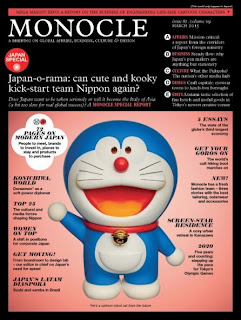I recently picked up the March issue of The Monocle, a magazine aimed at businesses "hungry for opportunities and experiences beyond their national borders." This particular issue focused primarily on Japan and it caught my eye thanks to the huge image of Doraemon on the cover. While the issue touched on a number of topics related to Japanese business, there were several articles throughout that discussed the pop culture aspects of Japan that comic fans may be familiar with. Doraemon got it's own article, but Shueisha (publisher of Shonen Jump and One Piece) gets discussed, and there's an extensive piece on the market of companies that produce kawaii mascot costumes for marketing purposes. (Yes, there's an entire market for these guys!) The magazine also has pieces on fashion, J-pop, and electronics.
I haven't read the entire magazine, but from what I have read, they seemed to do pretty in-depth analysis. Mostly at the market level, not at the individual company or product level, but the magazine is geared towards providing potential investors broad directions on what markets might be worth investigating at a global level, not necessarily which companies to invest in.
I'm torn in how I think about the issue. On the one hand, the coverage basically hits a lot of the topic areas that I would expect a broad population might think about when they might think about Japanese culture. So one could argue that the magazine editors were indeed choosing content based on what are indeed solid markets. But at the same time, these are markets that anyone involved in pop culture examinations in general would see as well worn areas. Manga popularity in the US isn't exactly new any longer after all. So are the magazine editors instead just using a sort of perceived common knowledge to make their judgements without any real investigation into other possibilities? Further along that line, are their ideas in fact already out-dated because they're on the trailing end of what's already achieved a high degree of popularity and broad acceptance, thus making their suggestions poor ones; by the time an investor does their due diligence and then invests in a specific company, wouldn't the market likely be on the decline?
I've never read The Monocle before, so I honestly don't know they're broader approach very well. Basically just what I read in the past few days. But it's interesting to see how ultra-rich investors see the same ideas and companies that we, as media consumers, interact with on an often more personal level.
Now Available!
Blog Archive
-
▼
2015
(253)
-
▼
April
(21)
- On -isms: Con Haul
- Weekly Comics Links
- On History: Leroy Lettering
- On Business: Freelance Nation
- On Strips: Non-Con
- On -isms: "For Girls"
- Weekly Comics Links
- On History: John Byrne's Unused FF
- On Business: View of Japan
- On Strips: Pre-Star Wars
- On -isms: Herb Trimpe & Ageism
- Weekly Comics Links
- On History: Steranko Histories
- On Business: Marts & AfterShock
- On Strips: Stephen Bentley?
- On -isms: Congrats, Kylie Wu!
- Weekly Comics Links
- On History: Batman
- On Strips: Dateline: Danger!
- On -isms: The Guest List
- Weekly Comics Links
-
▼
April
(21)








0 comments:
Post a Comment